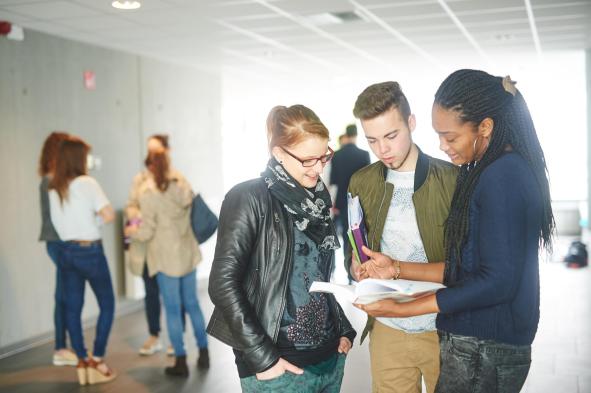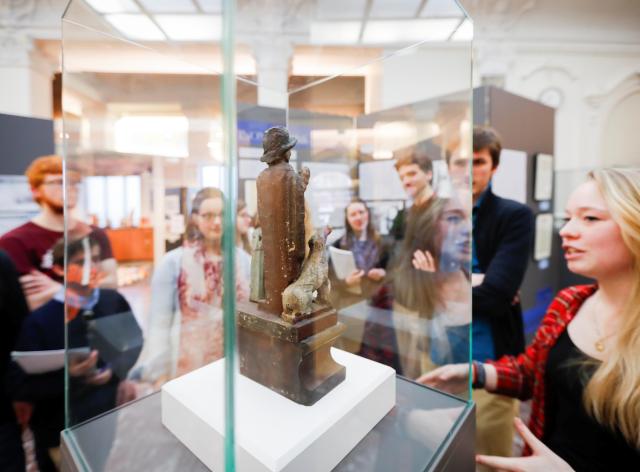Preparatory courses
Discover university education and life at UNamur while revising the subjects essential for your future training.
To get your first year of study off to a good start, the Faculty of Philosophy and Humanities is offering courses and exercises at the end of August that will enable you to:
- check your command of the French language, your ability to take notes and report on an oral presentation or a text;
- approach activities specific to art history and archaeology;
- discover the demands of university life and the student profession;
- initiate you in the methodological principles of your discipline;
- confront your choices of disciplinary orientation.
Do you have what it takes?
Test your knowledge and skills with "Passeports pour le bac".
At the start of your first year, "Passeports pour le bac" allow you to compare what you've learned with what your teachers expect.
Following these tests, the Faculty offers you sessions and workshops to reinforce your:
- reading strategy;
- analysis of questions and construction of appropriate answers.
You thus fill in any gaps and promote your success.
Are your methods appropriate?
To succeed in your first year, you need effective strategies.
Every Wednesday, two hours of methodological sessions are organized to familiarize you with university learning techniques:
- taking clear, comprehensive notes;
- summarizing and synthesizing material;
- understanding material in depth;
- building your study tools;
- memorizing large amounts of information;
- managing your time during class and blockade periods;
- organizing your work;
- anticipating teachers' demands.
In addition to these methodological sessions, your Faculty's Cellule d'Appui Pédagogique organizes individual assessment interviews after your tests and exams. If you request it, you can also benefit from personalized follow-up throughout the year.
If you're experiencing difficulties with your study method in general, the cellule interfacultaire d'appui pédagogique also offers individual follow-up. Throughout the year, an advisor is on hand to take stock of your study methods and techniques and help you improve them.
Finally, on the eve of the first blockade, you can take part in an exchange and advice session with 2nd or 3rd year students under the supervision of the Cellule d'Appui Pédagogique.

How can you consolidate your reading and writing skills?
Learn to express yourself correctly in writing and deepen your understanding of texts.
The Cellule d'Appui Pédagogique at your Faculty enables you to improve your skills in a number of areas:
- writing assignments and exam answers
- by language tests at the start of the year assessing spelling, vocabulary;
- by reinforcement sessions in workshops and through online exercises;
- by supervision of some of your written work: commented individual and group corrections ;
- by organizing mock exams (November tests) ;
- by individual follow-up (by e-mail and face-to-face).
- reading and comprehension of university-level texts
- by a reading test at the beginning of the year;
- by reinforcement sessions on reading strategies.
Special follow-up is provided for students whose mother tongue is not French.
What resources are available to you?
Central and department libraries, computer space and e-learning platform: valuable resources.
At the central library ("BUMP" for Bibliothèque Universitaire Moretus Plantin), you can consult: catalogs, dictionaries, encyclopedias, bibliographies, literary works, CD-ROMs, databases... Rarer or specialized journals or books can be obtained on request.
At the department library, you can access specific work instruments located in the immediate vicinity of the classrooms. Certain courses that require direct access to scientific literature also take place there from time to time.
For writing up your assignments, familiarizing yourself with the various programs specific to your discipline and carrying out your research on the Internet, the Faculty of Philosophy and Letters provides you with a computer area.
And that's not all! Thanks to the WebCampus e-learning platform, you can download the documents that teachers make available to you, access discussion forums with other students, and ask your questions live...
The WebCampus e-learning platform allows you to download the documents that teachers make available to you.How can you prepare for the exams?
Studying regularly, acquiring good methods, but also knowing the teachers' requirements and their way of questioning.
In the first year, formative assessments are organized in early November in certain subjects. Teachers correct your papers, comment on them and organize group correction sessions. Following these assessments, the Cellule d'Appui Pédagogique organizes individual assessment interviews and offers more personalized follow-up, particularly in French. These tests have no bearing on the grades awarded at the end of the year. They are simply a training tool to help you appreciate the high standards of our teachers and assess the effectiveness of your work.
After the first year, you can adapt your efforts more effectively to the nature and importance of each subject in the program. As a result, you no longer benefit from regular quizzes, other than as part of tutorials.
Exam organization
January, June and, if necessary, August... three sessions to prove your mastery of the subjects.
In January, you sit the exams on the 1st term courses. If you fail, you can retake the relevant exam in June and/or August. Three chances to succeed, but only in the first year of your bachelor's degree. From the second year onwards, any exam failed in the January or June session is automatically carried over to the August session.
According to the choice of the teachers, exams may be assessed either in writing or orally. Assessment procedures are specified during the first course and are detailed on the university website.
Verification of knowledge gained from technical courses is almost continuous; it relies above all on personal assignments organized during the year. Language courses are also accompanied by regular tests.





